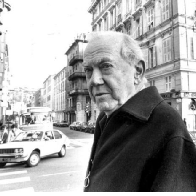 |
||||||||||||
 |
 |
|||||||||||
 |
 |
 |
 |
 |
 |
 |
||||||
 |
||||||||||||
 |
 |
 |
||||||||||
 |
||||||||||||





What was it about?
The story follows one Alfred Jones who works as a translator for a Swiss chocolate company. He is a widower, still mourning the loss of his first wife when he meets Anna-Luise, a woman some 30 years younger. They fall in love and decide to marry, however Jones has to contend with Anna's father, Dr Fischer, a distinctly peculiar and extremely wealthy man. He is invited to attend a series of excruciating dinners in which Fischer's sycophantic group of friends compete to win lavish presents, debasing themselves in the process. Jones must resist Dr Fischer's attempts to draw him into the circle, but when tragedy strikes he is unable to keep his distance.
What did we think of it?
We began by talking about Greene and what we knew of him and his other writing. He was a contemporary of Ian Fleming and was a prolific author, writing novels such as Our Man In Havana, The Power and the Glory and The Quiet American. He set himself up to be a popular writer as well as a literary one and was extremely successful at it. Many of his books are familiar to us through film adaptations. He was also bipolar and attempted suicide repeatedly as a young man. His wife said that he should never have been married. The comment was made that he writes beautifully but he's always telling you the story. None of his books is that long, but they are all narrative driven. Amanda recounted that there was once a comptetition to emulate Greene's style. Apparently he entered, and came second!
Greene was preoccupied by ideas around Catholicism and the battle between good and evil, which is exemplified in Dr Fischer. Wrestling with ideas of whether or not there is a divine being, and asking himself what it all means, Amanda observed that Greene clearly tied himself in knots. We thought Dr Fischer played out moral and existential ideas, but without much truth. The characters didn't seem real to us, particularly the 'toads' the friends of Dr Fischer who behaved to us in ways that didn't seem likely. We decided that in some ways the novella was beautifully written, concieved and full of intent – we were just mystified as to what that intent might have been.
Greene is a writer who holds an unassailable place as part of the British literary establishment, but reading this made us wonder whether his novels would stand the test of time.
Would we recommend it?
No, but those who have read them recommend The Comedians, The Power and the Glory, The Quiet American and his non-fiction work 'Journeys Without Maps'.
![]()
![]()
I like Graham Greene and I like the way he writes but there were only elements of this novel that I enjoyed. It's not great Greene. It basically comes down to 'evil is bad' and I didn't really care much at the end. But I hope the others will read other Graham Greene books.
![]()
![]()
I don't think there was very much to it and I didn't get much out of it. I found it old fashioned, and the evil Dr Fisher didn't seem particularly evil to me. A waste of reading time.
![]()
![]()
It didn't really affect me in any way. I haven't read any other Greene to compare it to, but from what I've heard tonight I suspect by the time he came to write this his best work was firmly behind him.
![]()
![]()
Technically proficient and very well crafted and pithy. Once I'd accepted its fairytale like nature I found I could enjoy it. I found it quite gripping and it left me wanting to read more by him.
![]()
![]()
I found this reasonably compelling. I was unhappy with the central relationship between a twenty year old and a fifty year old and I thought it lacked psychological truth. Ultimately I didn't understand the morality tale it was telling.
![]()
![]()
I can see it was well written and pithy and accessible, the writing flowed very well and I appreciated that it was quite plot-driven. It had economy and momentum. But in terms of the plot and what Greene was trying to achieve either I missed the point or it was too simplistic (if indeed it was a parable). There's good and bad, but not nearly enough nuance for me.

Our first book club of 2018 and we sat down at Sally's house for a sumptuous supper that happily did not include live lobsters or cold porridge. Kate contributed caviar crisps, which were generally thought to be disgusting.